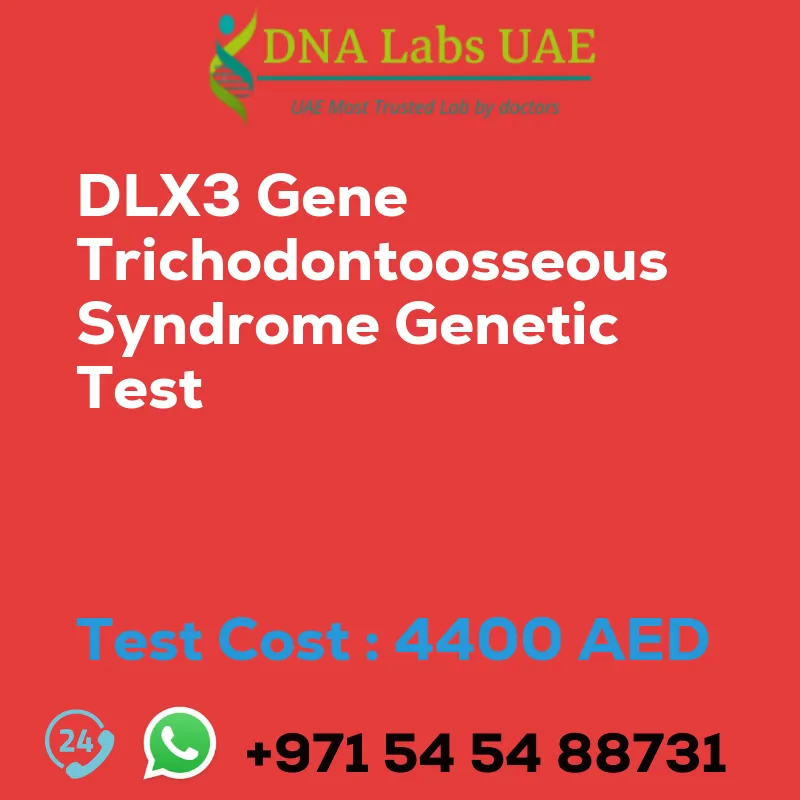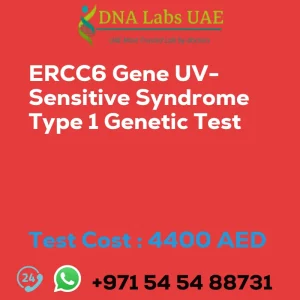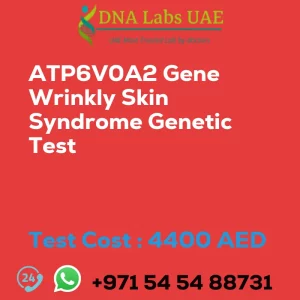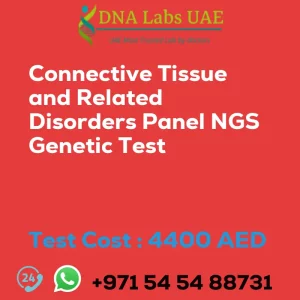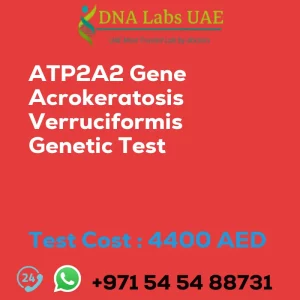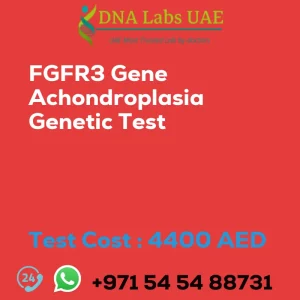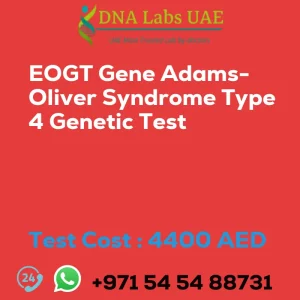DLX3 Gene Trichodontoosseous Syndrome Genetic Test
Are you concerned about Trichodontoosseous Syndrome? The DLX3 Gene Trichodontoosseous Syndrome Genetic Test offered by DNA Labs UAE can provide you with the answers you need. This blog post will cover everything you need to know about this genetic test, including its cost, symptoms, diagnosis, and more.
Test Details
The DLX3 gene is associated with a rare genetic disorder called Trichodontoosseous syndrome. This syndrome affects the development of teeth, hair, and bones. To diagnose this syndrome, DNA Labs UAE offers NGS (Next-Generation Sequencing) genetic testing. This method allows for the simultaneous analysis of multiple genes, providing a comprehensive view of an individual’s genetic makeup.
Components and Price
The cost of the DLX3 Gene Trichodontoosseous Syndrome Genetic Test is 4400.0 AED. The test requires a blood sample or extracted DNA, or one drop of blood on an FTA Card. The report delivery time is approximately 3 to 4 weeks. The test is conducted in the Genetics department of DNA Labs UAE and is overseen by a dermatologist.
Pre Test Information
Before undergoing the DLX3 Gene Trichodontoosseous Syndrome Genetic Test, it is important to provide the clinical history of the patient. Additionally, a genetic counseling session will be conducted to draw a pedigree chart of family members affected by the syndrome. This information will help in the analysis and interpretation of the test results.
Test Method
The NGS technology is used for the DLX3 Gene Trichodontoosseous Syndrome Genetic Test. This method involves sequencing the DNA sample obtained from the individual. The NGS technology generates a large amount of genetic data, which is then analyzed to identify any mutations or variations in the DLX3 gene.
Test Results and Their Importance
The results of the DLX3 Gene Trichodontoosseous Syndrome Genetic Test can confirm a diagnosis of the syndrome and provide information about the specific genetic variant present. This information is crucial for guiding treatment decisions and providing genetic counseling for affected individuals and their families.
Conclusion
If you suspect Trichodontoosseous Syndrome or have a family history of the syndrome, the DLX3 Gene Trichodontoosseous Syndrome Genetic Test offered by DNA Labs UAE can provide you with the answers you need. With its comprehensive analysis and accurate results, this test can help in the diagnosis and management of this rare genetic disorder.
| Test Name | DLX3 Gene Trichodontoosseous syndrome Genetic Test |
|---|---|
| Components | |
| Price | 4400.0 AED |
| Sample Condition | Blood or Extracted DNA or One drop Blood on FTA Card |
| Report Delivery | 3 to 4 Weeks |
| Method | NGS Technology |
| Test type | Osteology Dermatology Immunology Disorders |
| Doctor | Dermatologist |
| Test Department: | Genetics |
| Pre Test Information | Clinical History of Patient who is going for DLX3 Gene Trichodontoosseous syndrome NGS Genetic DNA Test. A Genetic Counselling session to draw a pedigree chart of family members affected with DLX3 Gene Trichodontoosseous syndrome NGS Genetic DNA Test gene DLX3 |
| Test Details |
The DLX3 gene is associated with a rare genetic disorder called Trichodontoosseous syndrome. This syndrome affects the development of teeth, hair, and bones. NGS (Next-Generation Sequencing) genetic testing is a method used to analyze the DNA sequence of an individual’s genes. It allows for the simultaneous analysis of multiple genes, providing a comprehensive view of an individual’s genetic makeup. In the case of Trichodontoosseous syndrome, NGS genetic testing can be used to identify mutations or variations in the DLX3 gene that may be responsible for the syndrome. NGS genetic testing for Trichodontoosseous syndrome involves obtaining a DNA sample from the individual, typically through a blood sample or cheek swab. The DNA is then sequenced using NGS technology, which generates a large amount of genetic data. This data is then analyzed to identify any mutations or variations in the DLX3 gene. The results of NGS genetic testing can help confirm a diagnosis of Trichodontoosseous syndrome and provide information about the specific genetic variant present. This information can be used to guide treatment decisions and provide genetic counseling for affected individuals and their families. |

